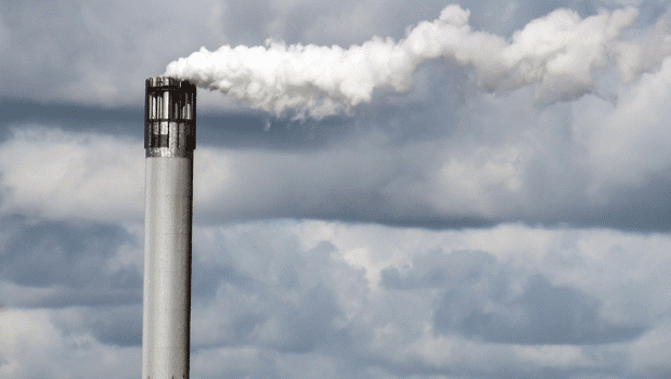
A staged and steady approach to reducing New Zealand's carbon emissions is being welcomed by farmers.
The Government has announced its latest carbon emissions target - it wants emissions to be cut by 30% between 2005 and 2030.
Business groups say that's ambitious, but climate campaigners say that isn't good enough.
The Intergovernmental Panel on Climate Change recommended a target of 40-70% drop in emissions by 2050.
But Federated Farmers climate change spokesman Anders Crofoot said forcing immediate change would hit farmers hard.
He said if they had to do it tomorrow, "it would basically mean just cutting production, really the only viable option at the moment."
Mr Crofoot believes continuing to become more methane and carbon-efficient.
"Continued investment will be required to develop science to reduce and treat biological agricultural emissions."
He said our butter remains the most carbon-efficient in the world.
"Even though we had to ship product halfway around the world to Europe, we're still more efficient than the local producers."
Opposition slam Government target
Climate change minister Tim Groser says the new target is more ambitious.
"This is a significant increase on our current target of five percent below 1990 emissions by 2020."
Labour once proposed a "fart" tax to make dairy farmers take responsibility for their belching cows - a major contributor of greenhouse gas emissions.
Tim Groser said the Government will not be going down that road.
"All that does is just drive down the profitability, and therefore drive production and exports down - it has no climate change effect whatever.
"We've done exactly the opposite - we've invested serious money in research."
Labour environment spokeswoman Megan Woods said the target will make it all but impossible for National to reach its goal of a 50 per cent reduction by 2050.
"Our targets should be at least comparable to what the European Union is doing with an overall target of 40 per cent of emissions below 1990 levels by 2030," she said.
“At the moment we are failing to meet our current targets. This is meaningless unless we actually meet them."
Green Party climate spokesman Kennedy Graham said the figure is patently inadequate - and comes with a touch of deception.
"They've switched the goalposts from 1990, which has always been the base year, to 2005, to try to dress it up."
Dr Graham said New Zealand will have to transition to a low-carbon economy sooner or later
"National will increase the cost of this transition by delaying."
Scientists call for higher targets
Victoria University policy studies expert Dr Adrian Macey said the Government has gone for a "minimum credible target".
"New Zealand had already put on the table a conditional target of 10-20% below 1990 by 2020, and already has an unconditional 5% below 1990 by 2020 target," Macey said.
"A great deal of work is now needed at home to determine the direction of our climate change policies, including the review of the Emission Trading Scheme."
Climate scientist Dr Jim Salinger admits New Zealand is uniquely placed with its high agricultural emissions.
"We are equally uniquely placed to lead on developing low-carbon solutions that support, enhance and potentially advantage our economy.
"We need to be more ambitious and match the EU promise to reduce greenhouse gas emissions by 40% by 2030."
Businesses cautious about target
Business New Zealand chief executive Phil O'Riley said the new target will not be easy to achieve.
"Our unusual predominance of agriculture and transport emissions, means we must deliberate about how we achieve reductions without harming the economy.
"Key to this will be balanced outcome for all countries taking part in the forthcoming negotiations."
Sustainable Business Council executive director Penny Nelson said there needed to be a long-term commitment to change how things are done.
"A target disconnected from the longer term pathway risks creating an unpredictable environment for businesses considering large long-term investments.
"Businesses leading action on efficiency... need certainty so they can make investments for change."
Target doesn't impress young people
Youth campaign groups are not happy with the target.
New Zealand Youth Delegation spokesman Francisco Hernandez said New Zealand is not doing its fair share.
“The emission targets will ensure New Zealand continues to shirk responsibility for doing our fair share in tackling emissions reductions."
He said other developed countries with thriving agricultural export sectors and a strong renewable energy sectors are doing better.
"Countries.. such as Denmark have been able to set a target of 40% under 1990 levels by 2020."
Generation Zero spokesman Paul Young said the target is shameful, given 99% of public submissions have supported a more ambitious target.
“You could say the Government has chosen a climate change target for the one percent who deny the need to transition to a low carbon economy.”
“That’s gutting for over 15,000 people who made the effort to make a submission or attend the consultation events.”
Mr Young said the target is not remotely ambitious, and young people will be the biggest losers from the target.
“It is shameful, and it is completely unfair on young generations who will be left dealing with the cost of inaction.
He said New Zealand needs to "grow renewable electricity, shift transport and heat needs to electricity and other clean energy, and absorb carbon by planting forests.”
Take your Radio, Podcasts and Music with you









